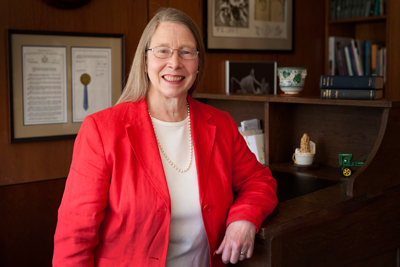Dean Susan Henry will step down in 2010
By Linda McCandless

Susan Henry will step down as dean of the College of Agriculture and Life Sciences (CALS) at Cornell when her second five-year term ends June 30, 2010.
She will have served as the Ronald P. Lynch Dean of Agriculture and Life Sciences for 10 years, as long as any recent college dean at Cornell.
"My time as dean has been enormously satisfying. While I will miss my daily interactions with the many committed people with whom I work closely as dean, I expect to continue my relationships with the CALS community as a faculty member when I return to teaching and research," Henry said. "I am continually impressed by the excellence of our faculty, students and staff and the level of enthusiasm of our alumni and stakeholders for providing leadership and improving people's lives in challenging times. I am very proud to be part of that effort."
Henry, who is a professor of molecular biology and genetics, will teach and spend more time in her research lab. While overseeing the second-largest college at Cornell, she has maintained a successful research program in molecular genetics, funded by the National Institutes of Health, using yeast as a model system. As dean, she participated in many discussions about revision of the biology curriculum and looks forward to teaching in the new program.
"Susan Henry has been extraordinarily effective as the dean of one of Cornell's largest and most complex colleges," said Provost Kent Fuchs. "Her commitment to excellence and her strong leadership have made a permanent, positive impact on Cornell. CALS is very fortunate to have had the benefit of her innovative and exemplary service."
Fuchs has appointed Ron Seeber, vice provost for land grant affairs, as chair of a search committee to identify Henry's replacement. Fuchs will seek input over the summer from the CALS community regarding committee membership. The committee is expected to have a set of candidates to interview in early 2010.
Henry focused CALS activities around four broad priorities: the land-grant mission, the applied social sciences, the environmental sciences and the new life sciences. With the help of faculty task forces, she instituted new majors in agricultural sciences, information sciences, and viticulture and enology to modernize undergraduate curricula in the environmental and biological sciences.
One of Henry's proudest achievements is the accreditation of the CALS undergraduate business program in the Department of Applied Economics and Management, and its subsequent ranking in the nation's top 10 by Business Week magazine.
Henry has been an effective steward of CALS as well as its facilities and farms. For the past nine years, CALS has continued the pace of faculty hires and balanced the budget despite declining state support. Under her watch, the renovation of Mann Library has been completed, a teaching winery and a biofuels laboratory have opened, and the state has committed funding for long-awaited renovations of Stocking, Warren, Rice and Fernow halls.
Henry's collaborations with international partners has resulted in the establishment of dual-degree programs with universities in India, and the signing of teaching and research memoranda of understanding with universities in Europe, Asia and Africa.
Henry served on New York Sen. Hillary Clinton's Agricultural Advisory Council and as a member of New York Gov. David Paterson's New York State Council on Food Policy.
Henry earned a Ph.D. in genetics at the University of California-Berkeley (1971) and her undergraduate degree in zoology at the University of Maryland (1968). Prior to coming to Cornell, Henry was dean of science of the Mellon College of Science at Carnegie Mellon University (1991-2000).
Linda McCandless is director of communications for CALS. Susan Kelley contributed to this article.
Media Contact
Get Cornell news delivered right to your inbox.
Subscribe